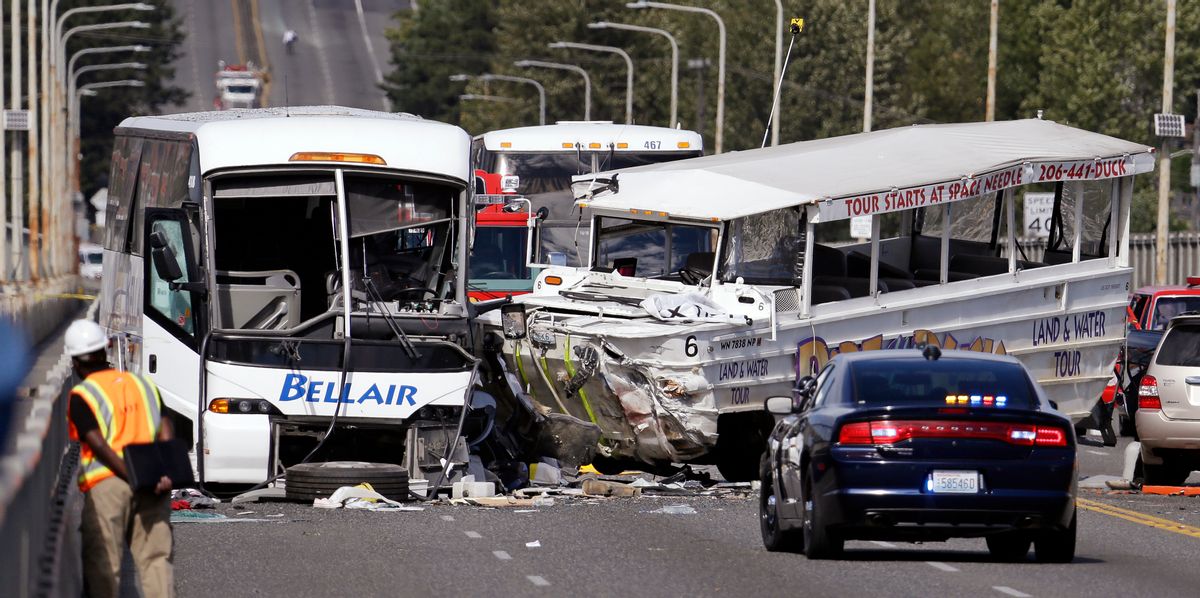The Missouri business that modified the tourist boat on which 17 people died didn’t follow federal vehicle design or manufacturing standards, according to a lawsuit in Washington state where five people were killed and dozens injured in an earlier accident.
Our nation’s agencies that are supposed to protect motorists and tourists – the National Transportation Safety Board and the National Highway Traffic Safety Administration – have allowed these duck boats to continue to operate. The Seattle fatalities and now the Missouri ones call into question our nation’s commitment to safety and Trump’s inaugural promise that his administration would be looking out for ordinary Americans.
Karen Koehler, an attorney who represents the families of three of the people killed in the Seattle crash and 41 of the injured, called the duck boats “Mad Max contraptions – part truck, part boat and welded together by people who were not engineers.”
The “stretch ducks” that killed five people in Seattle and 17 in Branson were designed by Robert McDowell who attended 2 ½ years of college and had no background, training or certification in mechanics, according to the lawsuit.
The stretch ducks were heavily modified World War II-era amphibious craft, with 15 inches added to fit in more people. Mechanics cut the chassis in half and took the frame from a surplus truck to add the extra 15 inches, according to the lawsuit.
McDowell consulted “a transmission person, as well as the maintenance people at the local Penske Truck group and the U-Haul down the street” but no engineers, according to the lawsuit.
Ride the Ducks produced 12 to 18 vehicles a year and “kept little documentation of the origins of the ancient parts,” according to the lawsuit.
McDowell, who had worked his way up to owning Ride the Ducks, sold a portion of his interest in 2001 to the Herschend Group, which then bought him out in 2004, according to the lawsuit. Ride the Ducks International was formed about the time of the 2001 deal.
In 2015, an axle failed on one of the duck boats as it was crossing the Aurora Bridge in Seattle, and it collided with a bus. Five college students were killed and 69 other people injured. Federal regulators fined Ride the Ducks International up to $1 million, and the company agreed to bring the boats into compliance with federal safety standards or ask for waivers.
The stretched duck boats continued to operate in Branson and other cities. In December, Ripley Entertainment Inc. bought the assets of the Branson operation.
On Thursday, 31 people got on a Ride the Ducks tour in Branson as bad weather approached. Seventeen died. The boat was raised Monday from Table Rock Lake, its unused life jackets dangling inside.
“I thought I was dead,” said Tia Coleman, whose husband, three children and five other relatives were among the dead. “I didn’t know how to get out.”
The Branson duck boats are owned and operated by Ripley Entertainment Inc. which bought the assets of the Branson duck boat tour business in December, said Ripley spokeswoman Suzanne Smagla-Potts. Ripley Entertainment does not own Ride the Ducks International.
Whether these deaths will prompt a serious investigation by Congress into the adequacy of federal safety inspections, which the Trump administration wants to cut severely, will likely depend on whether voters demand action.
Featured image: A Ride the Ducks duck boat was involved in a fatal highway crash in Seattle on Sept. 24, 2005. Five college students were killed and 69 other people injured. (AP Photo/Elaine Thompson)




Shares